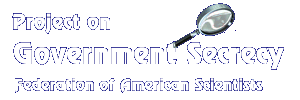 FAS |
Government Secrecy |||
Join FAS
FAS |
Government Secrecy |||
Join FAS

 |
|
|

Secrecy and Security News
Newer News: December 2000
November 2000
- Wen Ho Lee Tapes Expected to be OK by Jennifer McKee, Albuquerque Journal, November 30. "While lawyers on both sides of the case have been mum about the
dump search, others view the development as the beginning of the end of Lee's long involvement with federal law enforcement."
- Secretary Richardson Announces Fellowship To Research History of Atomic Age, DOE press release, November 28. "This will be a story written for people -- not historians -- and it will
help remind everyone of the sacrifices and strides made during this era."
- DoD Press Briefing: Pentagon Inspector General Report on John Deutch, daily briefing by ASD(PA) Ken Bacon, November 28. "The IG report basically looks at what Dr. Deutch did with his
computers and whether or not it complied with DOD regulations."
- Congressional Commission Calls for New NRO Space 'Recce' Office by Amy Butler, Inside the Air Force, November 17. "Have you ever heard of the [Federation of American Scientists]? That is what [the commission is] upset about."
- U.S. to Declassify Records on Argentina Dictatorship, State Department press statement, November 17. "Secretary of State Albright has instructed Department personnel to identify for declassification and release documents related to human rights violations committed in Argentina during the 1976-to-1983 military dictatorship."
- Document Diplomacy: President Releases Records to Vietnam, press briefing by Samuel R. Berger, November 17. "Included in the documents we're providing today, for example, are records from medical units here in Vietnam that actually treated Vietnamese wounded soldiers who then died."
- A Balance on Secrecy, editorial from the Providence Journal-Bulletin, November 15. "One of the hardest things that a free and open society has to do is to protect national security secrets without illegitimately and sometimes dangerously protecting government from public scrutiny."
- Clinton's Declassification Legacy Secure; Policies May Not Be by Eli J. Lake, United Press International, November 14. "President Bill Clinton has done more than any other president to lift the veil of secrecy that shrouds much of the United States' cold war history.... But with his successor in doubt, so is the future of Clinton's policy of national security sunshine."
- White House Statement on Chile Document Declassification, press statement, November 13. "One goal of the project is to put original documents before the public so that it may judge for itself the extent to which U.S. actions undercut the cause of democracy and human rights in Chile."
- U.S. May Face Net-Based Holy War by Dan Verton, Computerworld, November 13. "As hacker groups in the Middle East threaten to launch a "cyber-Jihad," or electronic holy war, security experts said Internet security at most U.S. companies remains woefully inadequate to defend against such attacks."
- New polygraph law may mean tests for thousands of lab employees by Andrea Widener, Contra Costa Times, November 9. "The already sensitive issue of polygraph testing for employees at the nation's weapons design laboratories has been inflamed by a new law that requires the controversial security measure for even
more lab workers."
- The forgotten 'spy' case of a rocket scientist by Peter Grier, Christian Science Monitor, November 8. "Viewed from afar, the McCarthy-era case of Tsien Hsue-shen stands as an eerie precursor to the Wen Ho Lee storm. Yet neither Dr. Lee's proponents nor his prosecutors
can draw easy lessons from this chapter in history."
- Pentagon Press Briefing: Excerpts on Veto of "Leak" Statute, briefing by ASD(PA) Kenneth H. Bacon, November 7. "There can be over-classification or misclassification. I don't think anybody disagrees with that. There are many problems with our classification system."
- Clinton Vetoes Intelligence Spending Bill by Neil King Jr., Wall Street Journal, November 6. "Supporters of a measure to crack down on government employees who leak official secrets say they aren't giving up after President Clinton vetoed the proposal over the weekend."
- CIA Statement on Veto of Intelligence Authorization Act, CIA press release, November 6. "We look forward to working with all parties to craft a new provision that helps preserve national security while fostering the necessary public discussion of important issues."
- Clinton Vetoes Bill on Leaking of U.S. Secrets by David G. Savage, Los Angeles Times, November 5. "President Clinton vetoed a bill Saturday that would have sharply expanded the government's power to prosecute anyone who revealed official secrets, including whistle-blowers or even ambassadors who briefed news reporters."
- President Clinton's Veto Statement on the "Leak" Statute, White House release, November 4. "Although well intentioned, that provision is overbroad and may unnecessarily chill legitimate activities that are at the heart of a democracy." (draft signing statements that were rejected in favor of a veto)
- Anti-Leak Bill Splits Clinton Aides by Walter Pincus, The Washington Post, November 3. "Top Clinton aides failed to reach agreement yesterday on a controversial measure that makes it easier to
prosecute government officials for leaking classified information."
- Polygraph Testing and the DOE National
Laboratories by Steven Aftergood, Science, November 3. "The Congressional requirement for polygraph testing of certain employees has arguably diminished both science and security at the national labs."
- New lie detector order at nuclear labs will hurt security, critic charges by Lawrence Spohn, Albuquerque Tribune, November 3. "A leading critic of government secrecy charged that a new congressional directive regarding polygraphs is likely to increase turmoil at America's nuclear weapons laboratories, further demoralize scientists and undermine national security."
- Are Polygraph Tests Lying to Us? by Michael Stroh, Baltimore Sun, November 3. Wen Ho Lee case and federal employee opposition to lie detectors re-ignite 80 year old controversy.
- Lie Detector Rules Are Scientifically Unsound by Merritt McKinney, Reuters Health Newswire, November 2. "Congress's decision to require certain Department of Energy (DOE) employees
and contractors to undergo lie detector tests is based on bad science, a Washington, DC, scientist contends."
- Attorney General Reno's Weekly Press Briefing -- Excerpts on Leaks, November 2. "Ms. Reno, is there anything in this legislation that would prevent a federal judge from holding a reporter in contempt?"
- Government Secrecy in a New Administration and a New Century, a one-day symposium on December 5 sponsored by the Information Security Oversight Office and the James Madison Project. Brochure and registration form may be downloaded in PDF format (a 300k file).
- Clinton may back away from bill that would jail officials for disclosing secrets by Jonathan S. Landay, Knight-Ridder News Service, November 2. "Facing an unexpected barrage of criticism, the White House voiced second thoughts Wednesday about legislation that would heighten government secrecy."
- Lots More Polygraphs Likely at Los Alamos by Jennifer McKee, Albuquerque Journal, November 2. "The program, which expands polygraph tests to as many 20,000 employees throughout the Department of Energy, has sparked criticism from many, including President Clinton."
- Senator Schumer Calls for Veto of Intelligence Authorization Act, press briefing, November 1. "It is vital that the president protect the values that have allowed our nation to flourish, by vetoing this bill."
- ACLU Calls for Veto of Intelligence Authorization Act, letter to the White House, November 1. "We urge you to veto the Intelligence Authorization Act because the bill includes two provisions that threaten civil liberties."
- The Case for Leaks by Fiona Morgan, Salon, November 1. "Journalists are urging President Clinton to veto a bill that would make it a felony to disclose any classified information to the media."
- Special Issue on Government Secrecy, Bulletin of the Atomic Scientists, November 2000. "The Cold War is over, but the classification practices designed to protect U.S. nuclear secrets from the Russians are still with us."
- Pentagon Press Briefing on the "Leak" Statute, daily briefing by ASD(PA) Kenneth Bacon, October 31. "I think that there is a lot of room for confusion on what this provision would mean."
- President's Statement on Polygraph Policy in the Defense Authorization Act, Defense Authorization Act for FY 2001 signing statement, October 30. "I am deeply disappointed that the Congress has taken upon itself to set greatly increased polygraph requirements that are unrealistic in scope, impractical in execution, and that would be strongly counterproductive in their impact on our national security."
Older News: October 2000
 https://sgp.fas.org/news/2000/11/index.html
https://sgp.fas.org/news/2000/11/index.html
 Maintained by Steven Aftergood
Maintained by Steven Aftergood



